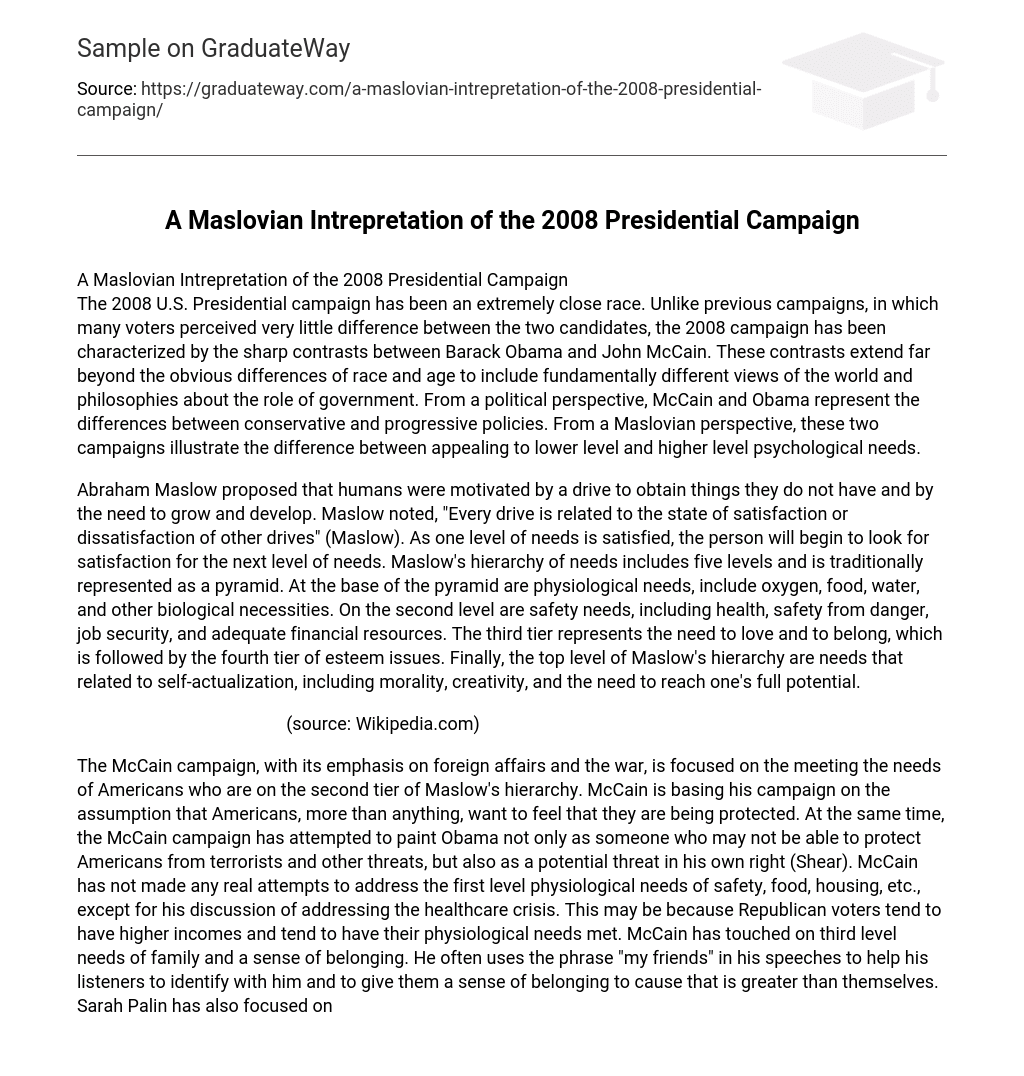The 2008 U.S. The Presidential campaign has been an extremely close race. Unlike previous campaigns, in which many voters perceived very little difference between the two candidates, the 2008 campaign has been characterized by the sharp contrasts between Barack Obama and John McCain. These contrasts extend far beyond the obvious differences of race and age to include fundamentally different views of the world and philosophies about the role of government. From a political perspective, McCain and Obama represent the differences between conservative and progressive policies. From a Maslovian perspective, these two campaigns illustrate the difference between appealing to lower level and higher level psychological needs.
Abraham Maslow proposed that humans were motivated by a drive to obtain things they do not have and by the need to grow and develop. Maslow noted, “Every drive is related to the state of satisfaction or dissatisfaction of other drives” (Maslow). At one level, of needs is satisfied, the person will begin to look for satisfaction for the next level of needs. Maslow’s hierarchy of needs includes five levels and is traditionally represented as a pyramid. At the base of the pyramid are physiological needs, include oxygen, food, water, and other biological necessities. On the second level are safety needs, including health, safety from danger, job security, and adequate financial resources. The third tier represents the need to love and to belong, which is followed by the fourth tier of esteem issues. Finally, the top level of Maslow’s hierarchy are needs that related to self-actualization, including morality, creativity, and the need to reach one’s full potential.
The McCain campaign, with its emphasis on foreign affairs and the war, is focused on the meeting the needs of Americans who are on the second tier of Maslow’s hierarchy. McCain is basing his campaign on the assumption that Americans, more than anything, want to feel that they are being protected. At the same time, the McCain campaign has attempted to paint Obama not only as someone who may not be able to protect Americans from terrorists and other threats, but also as a potential threat in his own right (Shear).
McCain has not made any real attempts to address the first level physiological needs of safety, food, housing, etc., except for his discussion of addressing the health care crisis. This may be because Republican voters tend to have higher incomes and tend to have their physiological needs met. McCain has touched on third level needs of family and a sense of belonging. He often uses the phrase “my friends” in his speeches to help his listeners to identify with him and to give them a sense of belonging to cause that is greater than themselves. Sarah Palin has also focused on family, although she has tended to focus on the second level need to protect family members more than on the inclusive idea of belonging.
The Obama campaign, on the other hand, has taken a broader approach that has attempted to address needs at all levels of Maslow’s hierarchy. Obama supporters appear to include a higher number of people with low incomes or who live in poverty. These people are concerned about very basic physiological needs such as food and shelter. These voters are also concerned about health care, but for different reasons than the McCain voters. While McCain tends to focus on healthcare as a financial problem, Obama has presented healthcare as a social problem. Like the McCain campaign, Obama has also attempted to address the safety concerns of voters, including concerns about the war and concerns about the financial bailout of Wall Street.
Unlike McCain, Obama has also attempted to address the higher levels of the hierarchy. Obama has reached out to a diverse group of voters and has asked them to become part of a movement that is greater than themselves. This inclusive message is characterized by a respect of himself and a respect for others. Obama has recognized that traditional leadership is not enough. People need to feel empowered. As he said, “We are the ones we’ve been waiting for. We are the change that we seek” (Obama).
By addressing all levels of Maslow’s hierarchy, Obama has broadened his appeal and has transcended traditional voter categories. Conversely, McCain’s focus on security and his appeal to fear addresses only one group of voters. Unfortunately, this is a very large group, which is why McCain is still in the race. Fear is a powerful motivator. The outcome of the 2008 election will say more about the mindset of the American voters than it will about the potential abilities of either of these men.
Works Cited
- Maslow, Abraham. “Theory of Human Motivation”. Classics in the History of Psychology. Ed. Christopher Greene. Originally Published in Psychological Review, 50 (1943), pp. 370-396. Online. 9 October 2008 < http://psychclassics.yorku.ca/Maslow/motivation.htm>
- Obama, Barack. “Remarks of Senator Barack Obama: Super Tuesday”. Chicago, Illinois, 5 February 2008. Online. 9 October 2008. <http://www.barackobama.com/2008/02/05/remarks_of_senator_barack_obam_46.php>
- Shear, Michael. “McCain Campaign Co-Chair: ‘Guy of the Street’ Obama Should ‘Come Clean’ About Past Drug Use”. Washington Post. 9 October 2008. Online. 9 October 2008 <http://voices.washingtonpost.com/the-trail/2008/10/09/mccain_campaign_co-chair_guy_o.html>





